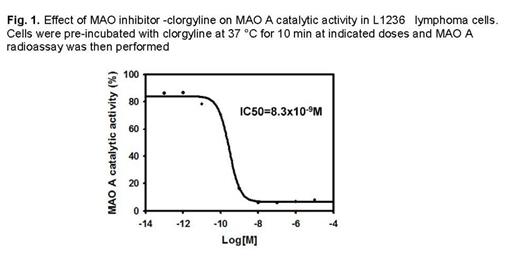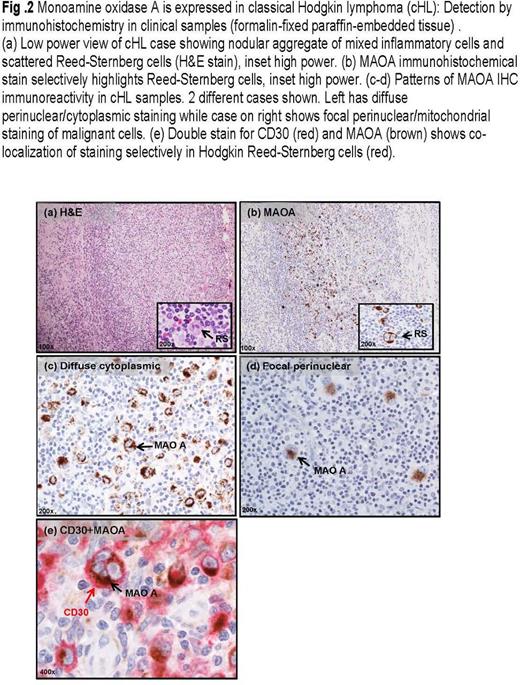Abstract
Monoamine oxidase A (MAO A) is a mitochondrial enzyme, which catalyzes oxidative deamination of neurotransmitters or dietary amines and produces H2O2. Recent work indicates that MAO A is overexpressed in prostate cancer. Inhibiting its activity suppresses tumorigenesis and metastasis. In this study, we showed that Hodgkin lymphoma (HL)-derived L1236 cells express high MAO A activity, while other human lymphoma cell lines examined, including both Hodgkin and non-Hodgkin lymphoma, do not express MAO A. We also analyzed MAO A expression by immunohistochemistry in formalin-fixed paraffin-embedded classical Hodgkin (n=88), nodular lymphocyte predominant Hodgkin (n=8) and non-Hodgkin lymphoma (diffuse large B-cell lymphoma, n=54; follicular, n=33; Burkitt lymphoma, n= 19; mantle cell lymphoma, n= 13). We found that 60% of the classical Hodgkin lymphoma (cHL) cases demonstrated at least some MAO A expression by the neoplastic Reed-Sternberg cells and 30% of the tumors show strong/uniform expression. In contrast, no MAO A activity was seen in normal lymphoid tissue, nodular lymphocyte predominant Hodgkin lymphoma or non-Hodgkin lymphomas. The MAO inhibitor clorgyline inhibited MAO A activity (IC50 of 8.3×10-9 M) and was cytotoxic (IC50 of 30 μM) to L1236 cells. In addition, clorgyline reduced the cell proliferation, colony formation, and invasion of L1236 cells in vitro. Taken together, we have shown for the first time that MAO A is expressed selectively in Reed-Sternberg cells of cHL. Our results suggest that MAO A may be a biomarker for classical Hodgkin lymphoma Reed-Sternberg cells and may provide biological insights as well as a potential therapeutic target.
No relevant conflicts of interest to declare.
Author notes
Asterisk with author names denotes non-ASH members.



This feature is available to Subscribers Only
Sign In or Create an Account Close Modal